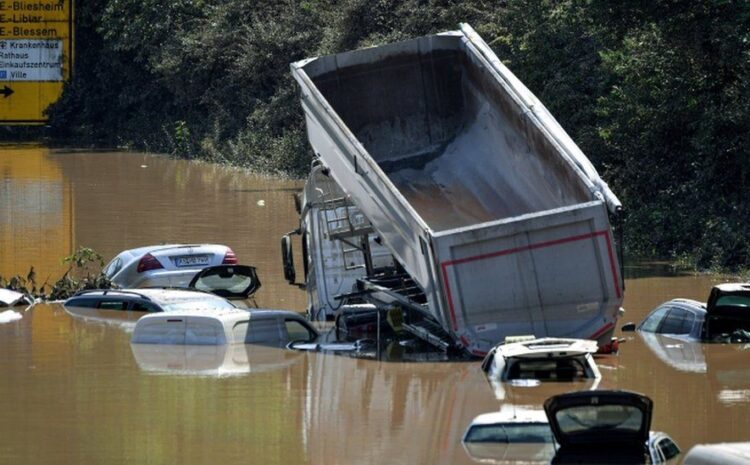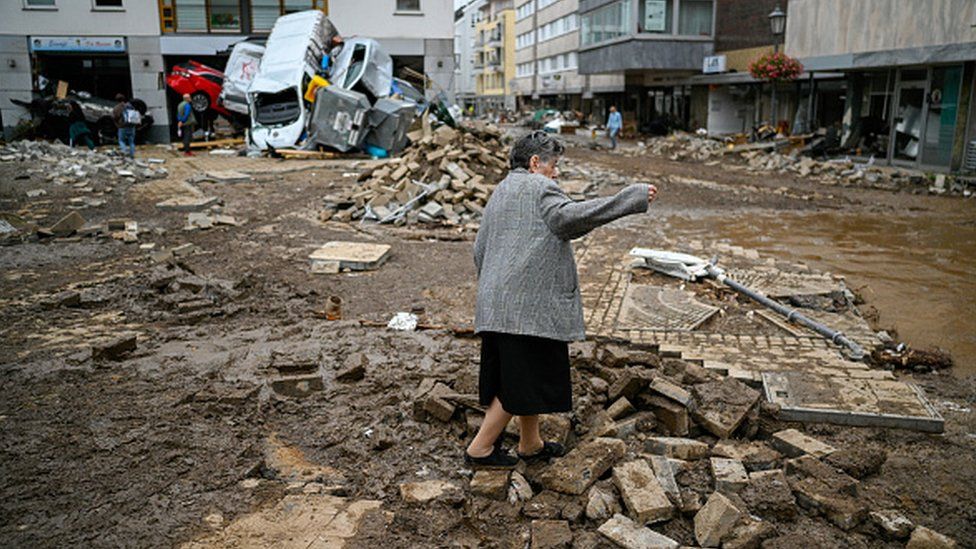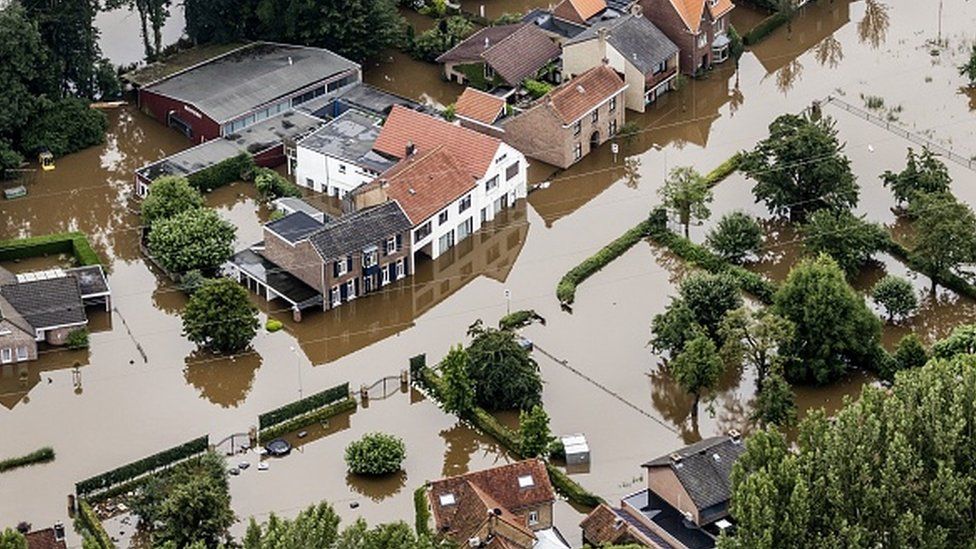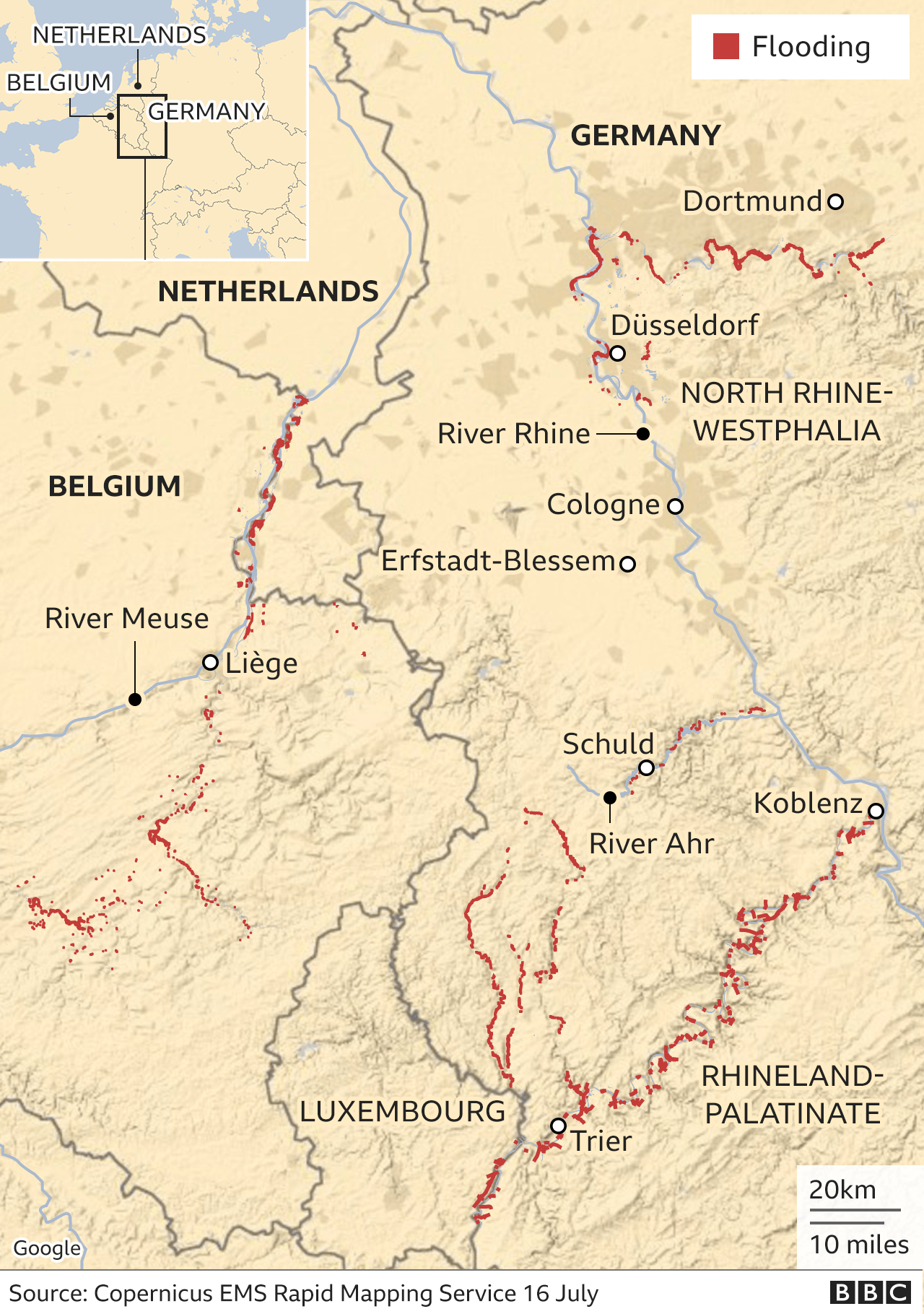
IMAGE COPYRIGHT EPA image caption Rescue workers are preparing to clear submerged cars from the B265 road
Many people are still missing after record rainfall triggered severe floods in Germany and Belgium, and the death toll is expected to rise further.
Submerged cars are being searched for bodies as flood waters begin to recede.
Switzerland, Luxembourg and the Netherlands were also hit. European leaders have blamed climate change.
Experts say global warming makes torrential rainfall more likely.
The world has already warmed by about 1.2C since the industrial era began.
In Germany, where the death toll stands at more than 100, President Frank-Walter Steinmeier said he was stunned by the devastation ahead of a visit to a flood-hit region on Saturday.
“Whole places are scarred by the disaster,” Mr Steinmeier said at a news conference. “Many people have lost what they have built all their lives.”
Rescue teams in Germany were hampered by difficult conditions on Friday, leaving relatives of the missing waiting anxiously for news.
But by Saturday the authorities said numbers of people unaccounted for had been steadily decreasing.
The states of North Rhine-Westphalia, Rhineland-Palatinate and Saarland have been the worst affected by the rainfall.
In North Rhine-Westphalia, emergency workers have been searching abandoned cars on the still flooded B265 road, but fire service spokesman Elmar Mettke said no bodies had yet been found.
“It seems like in the cars we have checked so far the occupants have all reached dry land unscathed. But we will continue to look and it will be a while until we are done here,” he told Reuters news agency.
 IMAGE COPYRIGHT GETTY IMAGES
IMAGE COPYRIGHT GETTY IMAGESA resident of Schuld in the Rhineland-Palatinate district of Ahrweiler told AFP news agency that cars had been washed away and houses knocked down in scenes he likened to a “war zone”.
In the nearby spa town of Bad Neuenahr-Ahrweiler residents were determined to begin the huge clean-up operation, scraping mud from the streets and clearing piles of debris.
But many businesses and livelihoods in the town have been swept away.
Despite the ongoing rescue efforts, people have reportedly been travelling to see the damage, leading the police in Mainz to ask people not to “tour a disaster area” where people had suffered so much loss. Similar warnings have been issued in the Netherlands, according to NOS.com.
Chronicle of a disaster foretold

Scientists have been predicting for years that summer rainfall and heatwaves would become more intense due to human-induced climate change.
Hannah Cloke, Professor of Hydrology at the University of Reading, said: “The deaths and destruction across Europe as a result of flooding is a tragedy that should have been avoided.
“The fact that other parts of the northern hemisphere are currently suffering record-breaking heatwaves and fires should serve as a reminder of just how much more dangerous our weather could become in an ever-warmer world.”
Scientists say governments must both cut the CO2 emissions that are fuelling extreme events, AND prepare for more extreme weather.
Yet in the UK – hit by severe flooding on Monday – the government’s advisory climate change committee recently told ministers the nation was even worse prepared for extreme weather than it was five years ago.
And only this week the UK government told people that they don’t need to reduce flying because technology will solve the emissions problem – a notion that most experts consider a gamble.

In Belgium, the army has been sent to four of the country’s 10 provinces to help with rescue and evacuations. Prime Minister Alexander De Croo declared 20 July a national day of mourning.
He said the floods – which have claimed at least 20 lives in Belgium – could be “the most catastrophic our country has ever seen”.
 IMAGE COPYRIGHT GETTY IMAGES
IMAGE COPYRIGHT GETTY IMAGESRescue workers from France, Italy and Austria were sent to the city of Liege, where residents were evacuated after flash floods.
Meanwhile in the Netherlands, thousands of people fled their homes in Limburg province as rising waters swamped cities and broke through a dyke.
But waters were receding in the southern city of Maastricht and nearby towns, where residents were able to return to their homes on Friday.
In Switzerland, lakes and rivers were also swelling after heavy rainfall. The river running through the Swiss capital Bern burst its banks on Friday.
Lake Lucerne is flooding into the town and people in Basel have been told to keep well away from the River Rhine.

How does climate change cause flooding?
- Global heating causes more water to evaporate, which leads to an increase in the amount of annual rain and snow
- At the same time, a warmer atmosphere means it can hold more moisture – which also increases the intensity of rainfall
- Rather than gently watering plants, this intense rainfall leads to flooding, like we’re seeing in Northern Europe now



1 Comments
This is the perfect blog for anyone who would like to understand this topic.
You realize a whole lot its almost tough to argue with you (not that I actually would want to…HaHa).
You certainly put a brand new spin on a topic which has been discussed
for ages. Wonderful stuff, just wonderful!